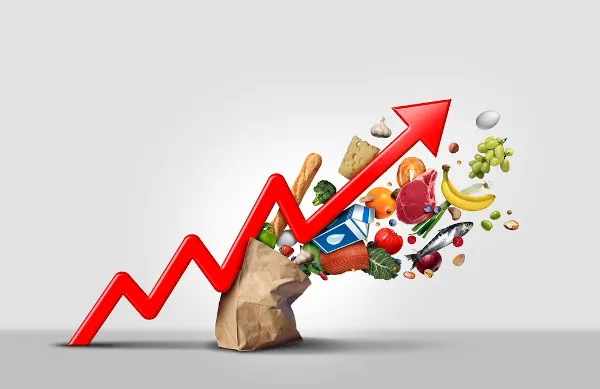As we head into 2025, inflation remains a key concern for households and businesses alike.
The cost of everyday goods and services continues to climb, making it harder for people to maintain their purchasing power. Whether you’re trying to save, pay bills, or plan for future purchases, understanding how to manage inflation and rising costs is critical for staying financially healthy.
Here’s a guide to help you navigate these challenges.

Understanding Inflation in 2025
Inflation refers to the rate at which the general price level of goods and services rises over time, decreasing purchasing power. In 2025, many countries will continue to face inflationary pressures due to various factors, including supply chain disruptions, energy prices, and global economic uncertainties.
While central banks may implement policies to control inflation, such as adjusting interest rates, inflation can still have a significant impact on consumers. Understanding the key drivers of inflation, such as food, energy, and housing, will help you anticipate price changes and make informed decisions.
Monitor Your Spending
One of the best ways to cope with rising costs is to closely monitor your spending. By understanding where your money goes each month, you can identify areas where you can cut back or adjust your budget.
Track Your Expenses – Inflation
Start by tracking all your expenses. Use budgeting apps or simple spreadsheets to categorize your spending. This will give you a clearer picture of where inflation is hitting hardest—whether it’s food, fuel, or entertainment—and help you adjust accordingly.
Focus on Necessities – Inflation
While it’s important to monitor all your expenses, you should prioritize spending on necessities such as housing, utilities, and food. Non-essential expenses, like dining out or entertainment, may need to be reduced or postponed as you focus on managing rising costs.
Build a Flexible Budget – Inflation
With inflation affecting different categories of spending, having a flexible budget can help you adjust to price changes as they occur.
Use the 50/30/20 Rule
A good budgeting guideline to follow is the 50/30/20 rule, where you allocate your income as follows:
- 50% for needs (essential expenses like rent, utilities, and groceries),
- 30% for wants (discretionary spending like dining out, travel, and entertainment),
- 20% for savings and debt repayment.
However, in times of inflation, you may need to adjust these percentages. For example, if food and utility costs increase, you might need to allocate more toward needs and reduce the budget for wants.
Prepare for Price Increases
As prices rise, you may need to increase the budget for essential items. For instance, if food prices go up, allocate more for groceries and reduce spending in other categories, such as subscriptions or leisure activities. This will allow you to stay on track with your financial goals despite inflation.
Strengthen Your Emergency Fund – Inflation
In times of economic uncertainty, having an emergency fund is more crucial than ever. If prices continue to rise, unexpected expenses—such as higher medical bills or car repairs—may become more frequent.
Build a Robust Cushion
Aim for an emergency fund that covers three to six months’ worth of living expenses. This will not only provide peace of mind but also allow you to manage unexpected costs without going into debt. As inflation may cause some prices to fluctuate unpredictably, having extra savings can give you more flexibility to deal with sudden financial demands.
Automate Savings
Set up automatic transfers to your emergency fund to make saving easier. Even if inflation is pushing your expenses higher, consistently saving—even in small amounts—will help you build a cushion over time.
Invest to Stay Ahead of Inflation
Keeping your money in a traditional savings account may no longer be enough to protect against inflation, as interest rates may not keep up with rising prices. To safeguard your purchasing power in 2025, it’s essential to consider investing.
Diversify Your Investments – Inflation
Consider diversifying your portfolio across a range of assets, including stocks, bonds, real estate, and precious metals. Equities (stocks) can offer a higher return than traditional savings accounts and can help hedge against inflation over the long term.
- Stocks: Investing in companies with strong earnings potential can provide protection against inflation, as many companies are able to pass increased costs onto consumers.
- Real Estate: Real estate investments, whether through direct property purchases or real estate investment trusts (REITs), often perform well in inflationary environments, as property values and rents tend to rise with inflation.
- Precious Metals: Gold and silver have historically been safe havens during times of inflation. Consider holding some precious metals in your portfolio to hedge against rising prices.
Inflation-Protected Securities
Some government bonds, like U.S. Treasury Inflation-Protected Securities (TIPS), are specifically designed to help investors keep pace with inflation. These bonds adjust their value in response to inflation, ensuring that your investment keeps up with rising prices.
Look for Deals and Discounts – Inflation
As prices rise, it’s more important than ever to look for ways to save on everyday items. You can stretch your budget further by finding deals, discounts, and cost-saving strategies.
Use Coupons and Cashback Programs
Take advantage of online coupon platforms, loyalty programs, and cashback offers to reduce the cost of your purchases. Many retailers offer discounts or rewards for regular customers, so signing up for these programs can lead to significant savings over time.
Shop in Bulk
For items that don’t expire quickly, consider buying in bulk. Wholesale stores or bulk buying groups often offer better per-unit prices, which can help mitigate the effects of price hikes on essential goods like food, toiletries, and cleaning supplies.
Take Advantage of Sales and Seasonal Discounts
Timing your purchases can also help reduce costs. Many retailers offer significant sales during certain times of the year—Black Friday, year-end clearance events, or back-to-school promotions. Planning ahead and purchasing items when they’re on sale can save you money in the long run.
Seek Additional Income Streams – Inflation
If rising costs are putting a strain on your budget, it might be time to explore ways to earn extra money.
Side Gigs and Freelancing – Inflation
Consider leveraging your skills through freelancing or taking on side gigs. Platforms like Upwork, Fiverr, or even gig economy jobs (such as delivery services or ride-sharing) can help you supplement your income.
Passive Income Investments
You might also explore passive income opportunities like renting out a room, starting an online business, or investing in dividend-paying stocks. Diversifying your income streams will not only help you cope with inflation but can also provide financial stability over time.
Reevaluate Big Purchases – Inflation
Inflation can make large purchases—like cars, electronics, or vacations—significantly more expensive. It’s a good idea to reassess major spending decisions in the context of inflation and your financial goals.
Delay Non-Essential Purchases – Inflation
Consider postponing non-essential purchases that can be delayed. For example, if you’re planning to buy a new car or home appliance, it might make sense to wait for better pricing or explore second-hand options.
Opt for Cheaper Alternatives
If you’re facing a price increase on a particular item or service, look for alternatives that meet your needs at a lower price. For example, buying a used car instead of a new one or choosing a less expensive vacation destination can reduce the financial burden of rising prices.
Stay Informed and Adaptable
Inflation and price increases are dynamic forces that can change rapidly. Staying informed about economic conditions and adjusting your strategies accordingly is essential for managing your finances effectively.
Stay Updated on Economic Trends
Keep an eye on inflation reports, government policies, and global economic news. Understanding the broader economic context can help you make better financial decisions and anticipate potential price increases.
Be Flexible
The key to managing inflation successfully is adaptability. If you find that your budget or investment strategy isn’t working as planned, be open to making adjustments. Flexibility will allow you to respond to new economic challenges as they arise.
Conclusion
Inflation is a challenge that will likely continue to affect consumers in 2025, but by monitoring your spending, budgeting effectively, investing wisely, and finding creative ways to save, you can minimize its impact on your finances. Being proactive and staying informed will help you make smart financial decisions, ensuring that you can thrive even in a time of rising costs.






